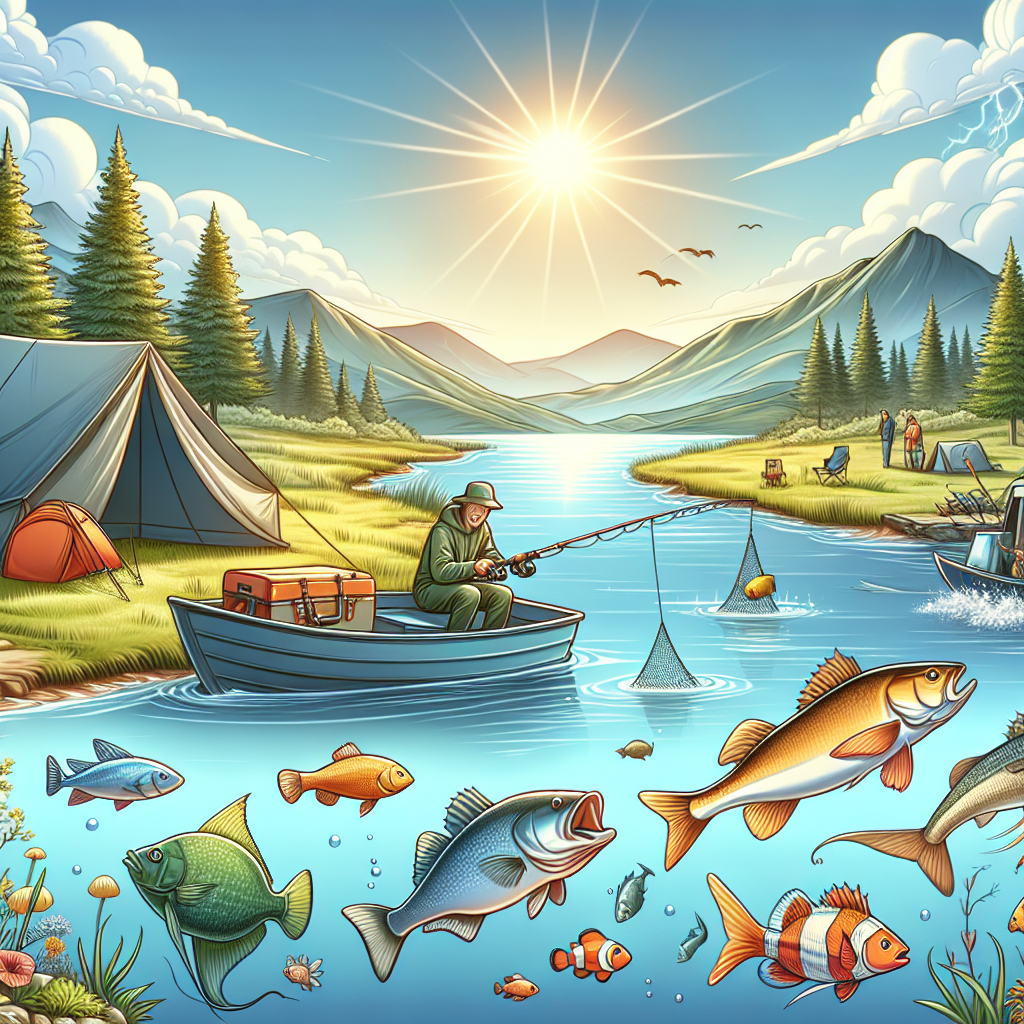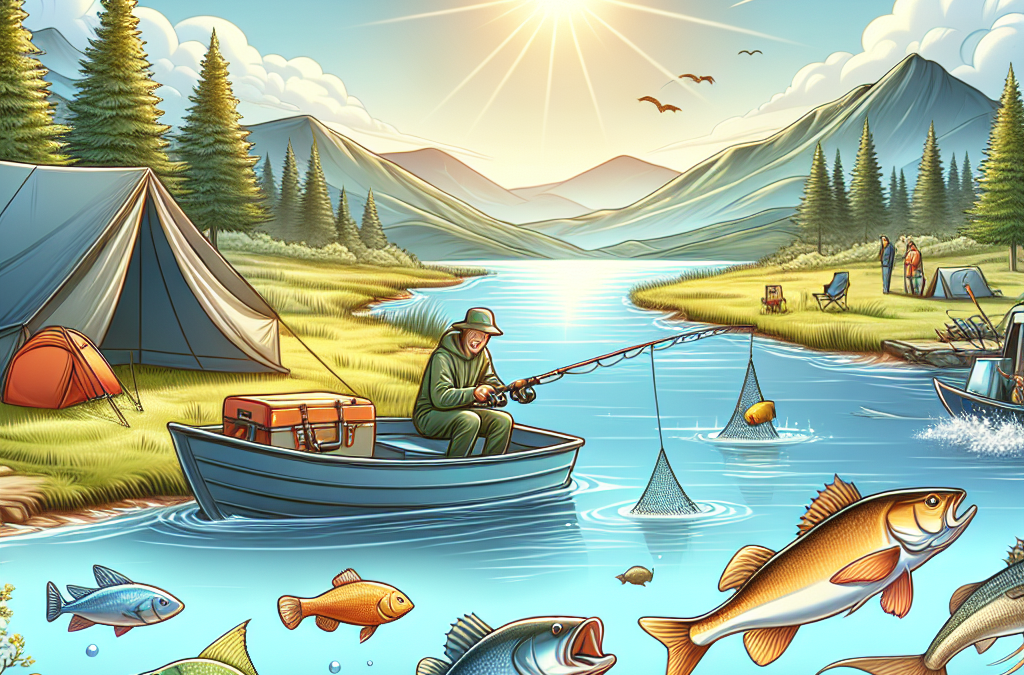Isn’t there something magical about waking up to the serenity of a radiant dawn in the midst of nature, grabbing your fishing rod, and heading towards the calming sounds of a nearby river? Indeed, blending a passion for fishing with the grandeur of camping can create remarkable experiences. “Fishing While Camping: Techniques and Licenses” serves as your comprehensive guide, threading through the intricacies of fishing techniques to master, as well as providing essential details on fishing licenses. The key to an enjoyable, stress-free camping and fishing expedition await you inside this very article!

Understanding the Basics of Fishing
The world of fishing is vast and filled with an array of species to catch, strategies to explore, and equipment to utilize. That said, understanding the basics of fishing can serve as a great starting point.
Types of Fish to Catch
Each species of fish presents a different kind of engagement. Freshwater fish, for instance, includes species like Trout, Bass, Carp, and Catfish, each with unique behaviors, habitats and sizes. Saltwater fish, on the other hand, features a vast variety including Tuna, Marlin, Mahi-Mahi, and Barracuda. Depending on what you want to catch, you’ll need to research about their behaviours and the most effective techniques of landing them.
Fishing Equipment Basics
Your search begins with fishing rods and reels of different types: cast-iron rods, spinning rods, fly-fishing rods, each designed for specific types of fishing. Other crucial equipment includes fishing lines, hooks, sinkers and floats. Your fishing gear should align with your target species, their weight, and the conditions you’ll be fishing under.
How to Bait and Hook
Tasks such as baiting a hook can seem intimidating at first, but once you get the hang of it, you’re halfway there. Choosing a bait is crucial, which could range from live baits like worms and minnows to artificial lures. The size of your hook must match the size of your bait and the fish you’re going after.
Essential Fishing Skills
Experience is undeniably the best teacher when it comes to fishing. However, certain techniques and strategies will surely enhance your ability to land a catch.
Casting Techniques
The casting technique is essential to fishing. A simple overhand cast serves well for beginners. As you progress, more complex techniques such as the pitch cast, flip cast, and roll cast will add finesse to your fishing experience.
Reeling In
Reeling in is a delicate balance of maintaining tension in your line and not exhausting the fish. Maintaining a steady, rhythmic retrieve is key to hooking and keeping the fish.
Unhooking and Releasing Fish Safely
It’s important to know how to handle fish properly. You should wet your hands before handling, grip the fish gently and remove the hook carefully.
Specific Techniques for Various Types of Fish
Each fish entails peculiar fishing strategies to perfect.
Fly Fishing for Trout
Fly fishing is a popular technique for catching trout. It involves casting a light artificial ‘fly’ onto the water, which mimics a natural food source to the trout.
Lure Fishing for Bass
Bass is attracted to a variety of lures- crankbait, spinners, and plastic worms, to name a few. The key here is to mimic the movement of their prey.
Deep Sea Fishing Techniques
Deep-sea fishing is a realm of its own, as you’re targeting much larger species. The major techniques include trolling, bottom fishing, and jigging.
Fishing Etiquettes While Camping
While fishing during camping, it’s vital to follow certain etiquettes to keep the environment intact and maintain a pleasant experience for everyone involved.
Respecting Wildlife and Nature
It’s important to remember that we’re visitors in nature’s domain. Do not disrupt the natural habitats and make sure you cause minimum disturbance to the wildlife around you.
Maintaining Cleanliness
Keep your camping and fishing area clean. Dispose of your trash properly and keep the water bodies unpolluted.
Respecting Other Campers and Fishermen
Respect other campers’ space and maintain a considerate noise level. You should also respect other fishermen by not fishing in their casts’ path.

Fishing Safety Measures
Safe fishing practices are essential to avoid mishaps and sustain a pleasant experience.
Safe Handling of Equipments
fishing equipment can be harmful if not handled properly. Hooks can cause injuries, and wrongly handled fishing rods can lead to accidents.
Avoiding Accidents near Water Bodies
Always look out for loose rocks, slippery surfaces, or high tides while fishing near water bodies. Wearing a life vest is a good safety practice, especially while fishing on a boat.
Safety Measures in Different Weather Conditions
It’s crucial to keep an eye on the weather conditions. Severe weather can make water bodies dangerous. Light rains can be tolerated, but it’s safer not to fish in thunderstorms or extremely windy conditions.
Understanding Fishing Licenses
Fishing licenses are a key part of the fishing laws in most countries. They ensure that fishing is maintained sustainably and its impact on the environment is kept in check.
Importance of Fishing Licenses
Fishing licenses help in the preservation of fish populations by imposing limits on the catch. They also contribute to the effort of wildlife and fisheries conservation.
How to Apply for a Fishing License
The process to apply for a fishing license varies by region. It can be purchased online, at the local department of fisheries office, or at authorized vendors.
Understanding Local and International Fishing Laws
Every country or state has their fishing regulations. Some limit the type of fish you can catch, their size and numbers, while others restrict the fishing methods. Know the local fishing laws wherever you plan to fish.
Choosing the Best Camping Spots for Fishing
The choice of camping spot can make or break your fishing experience.
Factors to Consider
Apart from the proximity to water bodies, the choice of spot should be influenced by factors like safety, accessibility, weather, and terrain conditions, and the presence of amenities.
Popular Fishing Campgrounds
Popular fishing campgrounds provide beautiful sceneries while guaranteeing a fruitful fishing experience. Such spots are typically rich in fish population and are equipped with essential facilities.
Camping Safety in Fishing Areas
Fishing areas can have flora and fauna with which you’re not familiar, so campsite safety measures are crucial.
Preparing Fish for Campfire Cooking
Once you’ve caught your fish, the next step involves preparing it for cooking.
Cleaning and Filleting Fish
Cleaning fish involves removing guts. Filleting involves cutting fish flesh into boneless pieces. It’s essential to clean and fillet fish correctly to avoid spoiling the taste.
Simple Fish Recipes for Camping
There are many simple yet delicious fish recipes perfect for camping. Grilled fish, fish on skewers, and frying are some of the easiest recipes you can try.
Storing and Preserving Fish While Camping
If you’ve caught more fish than you can eat, it’s crucial to Store it properly for future consumption. You can ice them, vacuum seal, or even smoke them for preserving.
Benefits of Fishing While Camping
Fishing while camping can be a pleasant experience and offers many benefits.
Stress Relief and Relaxation
Fishing allows you to be in the moment and distract your mind from the everyday hustle. Few things are as calming as sitting by a water body, casting a line, and waiting in anticipation of a bite.
Engaging with Nature
Additionally, fishing serves as an excellent opportunity to engage with nature. It can reconnect you with mother earth and help foster respect and appreciation for the natural world.
Learning New Skills especially for Kids
Fishing is an engaging activity that teaches patience, persistence, and survival skills. It can imbibe the love of outdoors and nature in kids from a young age.
Dealing with Fishing Challenges
Despite its many benefits, fishing can come with its set of challenges.
Overcoming Fishing in Bad Weather
Weather conditions can change rapidly during your fishing trip. By learning about fish behavior in different weather conditions, you can turn the odds in your favor and maximize your catch.
Coping with Not Catching Fish
The phrase ‘patience is a virtue’ is especially true in fishing. There might be times when you’re not catching anything, but that’s a part of the fishing process. Try different methods, move to a new spot or work on your techniques.
Dealing with Broken or Lost Equipment
Equipment failure can be a bummer during a fishing trip. Carrying a basic repair kit, spare lines, and hooks can save your day. Having a backup plan and being prepared is always a good approach, whether it’s fishing or life in general.

